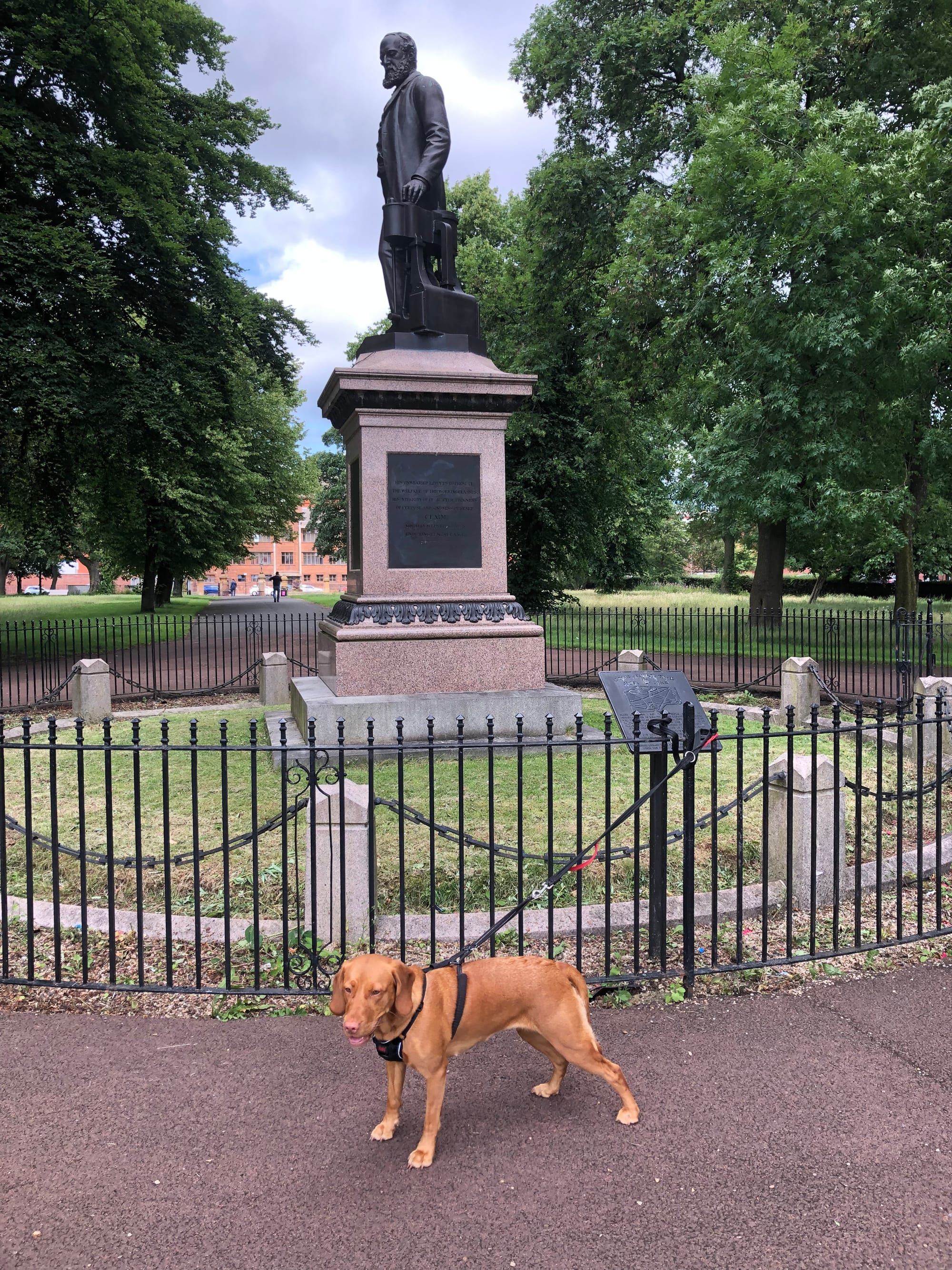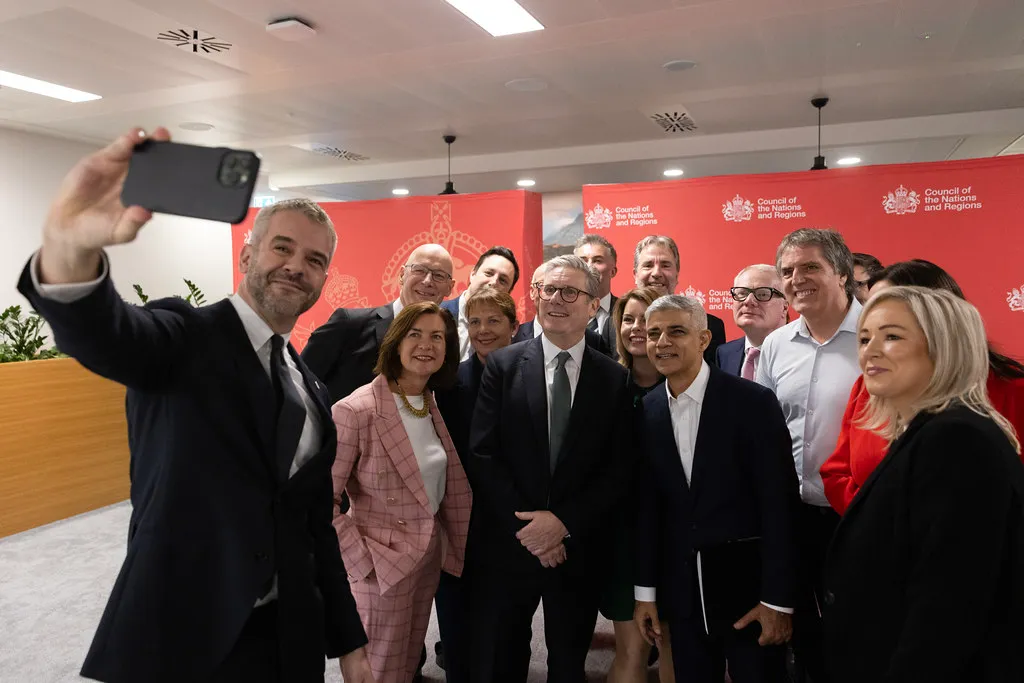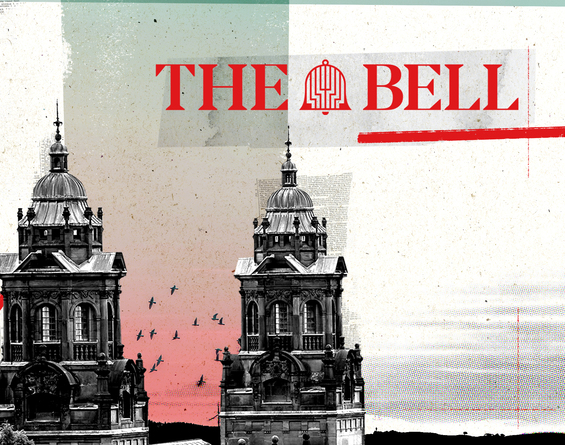Dear readers - Glasgow is waking up after taking a bit of a battering from Storm Ashley. Bridges were closed, flights were cancelled and The Bell can report at least one of our staffers was nearly blown off their bike on Bath Street. Less weather in today’s newsletter but we will be taking a closer look at increasingly stormy discussions on whether Greater Glasgow needs a metro mayor or not. Plus, we’ve got your curated guides on what to consume, both metaphorically and literally, this week.
Over the weekend, our subscribers enjoyed Samuel Reilly’s trip down the Clyde to examine the disappearance of passenger ferries upstream. There was praise on X for a “very good read” on a piece of the “old Glasgow jigsaw”, while Joe Miller shared memories of taking the ferry home after a night out. In the Bell comment section, Jane provided a final thought, writing: “Great read. Thought provoking. A sense of shifting times. Gentrification is the main worry, but if done right, with local communities properly supported and invested in, then it could bring harmony, and be beneficial to the people of Govan”.
We'll have another weekend feature coming up on Saturday that we promise – cross our hearts and hope to die – you won't want to miss. But for now, keep reading for your Monday briefing.
The big story: Are metro mayors really the answer to Glasgow's prayers?

Top line: Glasgow’s mayoral debate has reignited again, after Glasgow MSP Paul Sweeney penned a piece for the Glasgow Times, arguing that Greater Glasgow needs a directly elected metro mayor, in the style of English city region leaders like Andy Burnham. The article was less than 800 words long, yet caused quite the stir.
One SNP councillor called it “drivel that couldn't look more like a job application if he was holding a CV in the picture”. Another reader pointed to the existence of Glasgow’s Lord Provost and council leader as being enough (not the same; these are both roles focused solely on the city itself). But some were supportive, citing Burnham’s championing of Greater Manchester during the Covid-19 pandemic.
Over the border: Sweeney’s wasn’t the first intervention on the subject – and certainly won’t be the last. The figure of the metro mayor looms large in the political imagination north and south of the border. England’s mayoral agenda has picked up steam; during their 14 years in government, the Conservative party introduced 11 metro mayors, including in Greater Manchester, West Yorkshire and the North East of England. Half of England's population is now covered by one of these mayors and UK Labour plan to continue the process with their Devolution Bill.
Ok, but why are mayors coming up again? Sweeney’s screed was triggered by the first meeting of the Council of the Nation and Regions, a new intergovernmental political body which had its first get-together in early October. Metro mayors from England’s 11 combined authorities were there, yet the only Scottish representation was at a national level. This caused consternation, given Greater Glasgow is the fifth largest urban area in the UK.
Head honcho: Sweeney’s argument is that Greater Glasgow needs a “figurehead” to advance the region’s interests. For him, the existing Glasgow City Region cabinet, composed of eight local council leaders, is not enough. “It meets only a handful of times a year and voters have no say on who ultimately leads it,” he wrote. “It administers, it does not govern.”
More on mayors: In Glasgow, there seems to be two prevailing sentiments surrounding England’s metro mayors. One is idealistic: the hope that if Greater Glasgow just had a mayor it would solve a bunch of problems. The other is prickly scepticism, stemming from the fear that one individual holding so much power is both undemocratic (directly elected or not) and that Greater Glasgow needn't follow the example of the English.
Our take: If you want to know the truth about England’s metro mayors, without getting too deep into the weeds, the basic summary is that they are faces of a region, with limited powers. Bar Greater London, which has a different set up, English metro mayors are far more restricted than it might seem from the fanfare that surrounds them.
Bit of a night-mayor? Under the current devolution model, English regions sign a deal with the UK government to create a combined authority, usually with a metro mayoral role attached. Depending on the ‘level’ of deal, these new layers of government receive varying amounts of power and funding. Agree to a mayor, get more cash. Amid austerity, many councils took the plunge.
- Yet metro mayors (again, bar Greater London) can't set local taxation and have only indirect influence over planning – two of the most important areas. (UK Labour say they plan to devolve more in these areas, but details on how are still vague).
- One University of Huddersfield study last year concluded that transport was the only “hard power” metro mayors had been given (and even then, heavy rail – i.e. trains – is exempt).
Soft power: But Metro mayors can be very successful at winning both public and private investment to their region, if that’s the goal. Andy Burnham’s reign is cited so much in the ‘pro’ column due to his high public profile, and the associated inward investment into Manchester.
But other metro mayors have been less successful at creating a general buzz around their region.
- In some cases, like in the West of England, the metro mayor has fallen out with the combined authority to such a degree that the entire operation was put in the equivalent of special measures.
- Elsewhere, Tees Valley’s Conservative metro mayor has been dogged by persistent corruption allegations, despite a government inquiry concluding he was innocent.
Bottom line: If Paul Sweeney’s accusation is that a Glasgow City Region cabinet “administers but does not govern,” then a Greater Glasgow metro mayor in the English mould would promote but not govern. Councils still hold the lion’s share of the powers outside of Westminster and Holyrood.
If Greater Glasgow really wants to level up its future via further devolution, the city region should aim higher than adopting England’s current version. Mayor or no mayor, only powers close to, or on par with those held by the abolished Strathclyde Regional Council would really allow any public body to pack a punch. Otherwise, the ceiling of any prospective metro mayor’s achievements may just be getting a biannual seat at an Edinburgh conference table.
Do you think Glasgow should have a metro mayor? Let us know in the comments.
Your Bell briefing
➕ Bad sums: Cuts to teaching numbers in Glasgow have had – unsurprisingly – a “significantly negative” impact on the ability to deliver quality education, say primary school head staff. Since controversial teaching cuts were passed in February’s Glasgow City Council budget, The Herald has stayed with the story; now it has responses to a survey polling members of the Association of Headteachers and Deputes Scotland on how the cuts – which have culled 172 posts to date – are affecting educational delivery. The answer is: adversely. 95% of respondents said the impact of cuts was “as bad” or “even worse” than expected, with extra-curricular activities stopped, workloads increasing and staff wellbeing on the decline. For the full breakdown, check The Herald’s report.
🗣 It’s all talk: Want to quiz politicians face to face? BBC Debate Night is back in Glasgow this week on Wednesday 23 October and is recruiting for audience members. Recent discussions on the programme have featured discussions on Alex Salmond’s legacy and violence in schools. No word yet on the hapless politicians selected to actually face the public though… Sign up here for a chance to have your say.
🚧 Hold on a second… Just days after Glasgow City Council announced the next phase of their Avenues project, there are reports that some phases of the scheme may be placed “on hold” due to lack of funds. According to Glasgow Live, officials are seeking “alternative funding” to allow them to proceed with plans to regenerate the likes of Hope Street, St Enoch’s Square, Glassford Street and John Street, which form part of a multimillion-pound infrastructure investment under the Glasgow Region City Deal scheme. A council spokeswoman cited “challenging conditions”, including global supply chain issues, meaning cost projections for projects have ballooned since the initial City Deal cash had been allocated. But it’s not all doom; the council pointed to the successful progression of infrastructure works, such as the Govan-Partick bridge, three new city centre Avenues and refurbishment works at Tradeston Bridge.
Spot of the week: Is Elder Park in Govan, with additional modelling from Poppy. “Standing proudly in front of John Elder (bigger story there) she enjoys this great spot in Glasgow,” writes George McKay, who was taking his son’s dog out for a walk.

If you'd like to submit a 'Spot of the week', send in a short blurb and photo to editor@glasgowbell.co.uk.
Media picks
Bring me their heads: Somehow, the anodyne programme synopsis for ‘Here Comes the Guillotine’ doesn’t quite cut it, given the untethered conversation that inevitably ensues when you sit three of Glasgow’s top comedians down for an unstructured, off-the-cuff chat. In this episode, ‘The Information Void’, Frankie Boyle, Susie McCabe and Christopher Macarthur-Boyd discuss the nominative determinism of P. Diddy, why Ironman isn’t getting his end away often enough, and the time Drake blacked up. Safe to say, it’s not a podcast to listen to with kids in the car, or with your mum, or with many of your friends or acquaintances, for that matter.
“First I got cancelled, then I got cancer”: How best to describe Janey Godley’s comedy? Heart-wrenching, hilarious and unhinged would be a start. ‘Janey’, on BBC Scotland, charts her 2023 Not Dead Yet tour, following her ovarian cancer diagnosis. It’s intimate, raw and often laugh-out-loud funny. Much like the vagaries of life itself, it seems to oscillate wildly between moments of sorrow, absurdity and laughter — often all within the space of a minute. Godley was given the all-clear in 2022, but is now receiving end-of-life care, after the cancer returned and spread. “I don’t know how I feel about dying … it’s in ma heid aw the time,” she tells viewers. “That’s the thing about cancer — ye cannae escape the uncertainty.”
Why Twice?: Rosemary Hill’s wholly accurate if depressing piece in the London Review of Books gets to the heart of the stagnation and lack of imagination surrounding the future of the Glasgow School of Art. Hill addresses the wider decay of the city’s greatest architectural assets, such as Alexander ‘Greek’ Thomson’s Egyptian Halls and the St Vincent Street and Caledonia Road Churches. “Monuments to neglect and inertia, they are sad omens for the future of the Mack,” she writes.
Things to do

Tuesday
🍽️ One of the most hyped restaurant openings of the year, Margo, is already grabbing attention, largely due to this being the same team that brought us Ox & Finch and Ka Pao. It’s hard to overstate the impact the former has had on the city’s dining scene in the decade since it opened, whatever your feelings on the small plates trend they helped usher in. Ox & Finch is now closed until February 2025, and in timely fashion, Margo soft launches tomorrow. Expect similar vibes to its big sister, albeit more refined and with more in the way of ‘family style’ sharing plates than wee ones. They’ll be making their own pasta in house, as well as turning their hands to a bit of butchery. There are some seriously heavy hitters on the wine list, with a focus on natural and minimal intervention. Get half price off food until Sunday 27 October.
Wednesday
🏢 If you liked our piece on Glasgow’s ambivalent relationship with Brutalist architecture, then you can learn more about the exhibition that inspired it at Glasgow City Heritage Trust’s Brutal Glasgow talk, with curator Rachel Loughran and illustrator Natalie Tweedie. Unfortunately, in person tickets have sold out, but you can attend online. 6:30-7:30pm. Register here.
Thursday
🎸 Savage Mansion played their first show at the Hug and Pint back in 2016. Craig Angus and his band are back once more, this time playing music from Shakes, as well as their previous three albums, across two nights. Support from Dancer and Susan Bear. Tickets here.
Friday
🎥 Weird Weekend cult film festival returns, creating space for strange and unseen cinema from around the world. At OFFLINE, 138 Niddrie St. Info and tickets here.
Saturday:
🎶 There's still some tickets left to see Daniel Avery share the decks with Death in Vegas’ Richard Fearless at Berkeley Suite. It’s a mammoth five hour marathon, so get limbered up by listening to a six hour effort from the pair from 2023. Final tickets here.
Comments
How to comment:
If you are already a member,
click here to sign in
and leave a comment.
If you aren't a member,
sign up here
to be able to leave a comment.
To add your photo, click here to create a profile on Gravatar.







